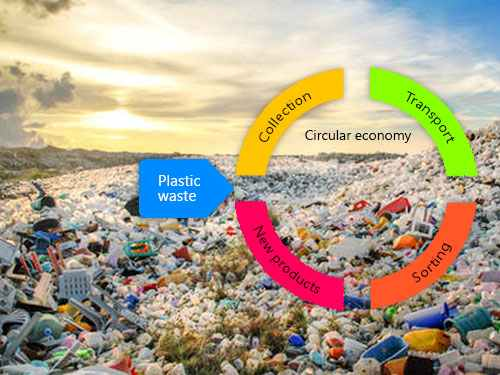
In News
India and Germany signed an agreement on Technical Cooperation titled ‘Cities Combating Plastic Entering the Marine Environment’ at a virtual ceremony.
Major Highlights of Agreement
- This project is envisaged under the contours of the Joint Declaration of Intent regarding cooperation in the field of ‘Prevention of Marine Litter’ signed between the Republic of India and the Federal Republic of Germany in 2019.
- Its outcomes are completely in line with the objectives of Swachh Bharat Mission-Urban focusing on sustainable solid waste management and Hon’ble Prime Minister’s vision to phase out single-use plastic by 2022”.
- The project will be undertaken at the national level (at MoHUA), select states (Uttar Pradesh, Kerala and Andaman & Nicobar Islands) and in the cities of Kanpur, Kochi and Port Blair for a period of three and a half years.
- Cities will be enabled to improve the collection, segregation and marketing of plastic waste, to prevent plastic disposal to water bodies, and to improve the handling of port and marine waste.
- This will be combined with data management and reporting systems, civil society involvement and increased cooperation with recyclers and the recycling industry through a digital platform.
- The special focus will be on preventing plastic litter from entering the rivers and water bodies at the source.
Plastic and Marine Environment
- Plastic is a synthetic organic polymer made from petroleum with properties ideally suited for a wide variety of applications, including packaging, building and construction, household and sports equipment, vehicles, electronics and agriculture.
- Plastic is cheap, lightweight, strong and malleable. Over 300 million tons of plastic are produced every year.
Sources
- The main sources of marine plastic are land-based, from urban and storm runoff, sewer overflows, beach visitors, inadequate waste disposal and management, industrial activities, construction and illegal dumping.
- Ocean-based plastic originates mainly from the fishing industry, nautical activities and aquaculture
Concerns /issues
- Plastics, as materials, are not an issue, but it is their management that has been a challenge. At least 8 million tons of plastic end up in our oceans every year.
- Floating plastic debris are currently the most abundant items of marine litter
- Plastic has been detected on shorelines of all the continents, with more plastic materials found near popular tourist destinations and densely populated areas.
- In recent times, the level of plastic waste that has accumulated in our oceans and marine ecosystems through the increased production and use of durable synthetic materials has alarmed the public and policymakers
- Impacts on
- Marine environment
- The most visible and disturbing impacts of marine plastics are the ingestion, suffocation and entanglement of hundreds of marine species.
- Marine wildlife such as seabirds, whales, fishes and turtles eat plastic waste and most die of starvation as their stomachs are filled with plastic debris
- Marine environment
- Food and health
- Invisible plastic has been identified in tap water, beer, salt and are present in all samples collected in the world’s oceans, including the Arctic.
- The transfer of contaminants between marine species and humans through the consumption of seafood has been identified as a health hazard .
- Climate change
- Plastic, which is a petroleum product, also contributes to global warming. If plastic waste is incinerated, it releases carbon dioxide into the atmosphere, thereby increasing carbon emissions.
- Tourism
- Plastic waste damages the aesthetic value of tourist destinations, leading to decreased tourism-related incomes and major economic costs related to the cleaning and maintenance of the sites.
Global Efforts To Tackle it
- Global concern and public awareness regarding the impact of plastic on the marine environment are currently increasing.
- Legal efforts have been made at the international and national levels to address marine pollution.
- The most important are
- The 1972 Convention on the Prevention of Marine Pollution by Dumping Wastes and Other Matter (or the London Convention)
- The 1996 Protocol to the London Convention (the London Protocol)
- The 1978 Protocol to the International Convention for the Prevention of Pollution from Ships (MARPOL).
- The most important are
- The United Nations Environment Program (UNEP) considers plastic marine debris and its ability to transport harmful substances as one of the main emerging issues affecting the environment.
- At the 2015 G7 summit in Bavaria, Germany, the risks of microplastics were acknowledged in the Leaders’ Declaration.
- The Global Programme of Action (GPA) for the Protection of the Marine Environment from Land-based Activities:
- The GPA is the only global intergovernmental mechanism directly addressing the connectivity between terrestrial, freshwater, coastal and marine ecosystems.
- Greenpeace:
- It is an environmental NGO that is dedicated to conserving the oceans and marine life across the globe.
- Its grassroots efforts have resulted in the ban of destructive fishing practices, companies changing their fishing policies, and the creation of whale sanctuaries.
India’s Efforts In Tackling Plastic Waste
-
- The Plastic Waste Management Rules, 2016 clearly stipulate that urban local bodies (ULBs) should ban less than 50 micron thick plastic bags and not allow usage of recycled plastics for packing food, beverage or any other eatables.
- The Rules also require that local bodies should provide separate collection, storage and processing of plastic waste in their areas.
- The government has set an ambitious target of eliminating single-use plastics by 2022.
- India is a signatory to MARPOL (International Convention on Prevention of Marine Pollution).
- In addition, Prevention of Marine Pollution is also dealt with by Merchant Shipping Rules, 2009 framed under the Merchant Shipping Act, 1958.
- The Plastic Waste Management Rules, 2016 clearly stipulate that urban local bodies (ULBs) should ban less than 50 micron thick plastic bags and not allow usage of recycled plastics for packing food, beverage or any other eatables.

Image Courtesy: Pyro
Suggestions
- Recycling and reuse of plastic materials are the most effective actions available to reduce the environmental impacts of open landfills and open-air burning that are often practised to manage domestic waste.
- Sufficient litter and recycling bins can be placed in cities, and on beaches in coastal areas to accelerate the prevention and reduction of plastic pollution.
- Governments, research institutions and industries also need to work collaboratively redesigning products, and rethink their usage and disposal, in order to reduce microplastics waste from pellets, synthetic textiles and tyres.
- Existing international legally binding instruments should be further explored to address plastic pollution.
Previous article
Facts in News
Next article
Startup India Seed Fund Scheme